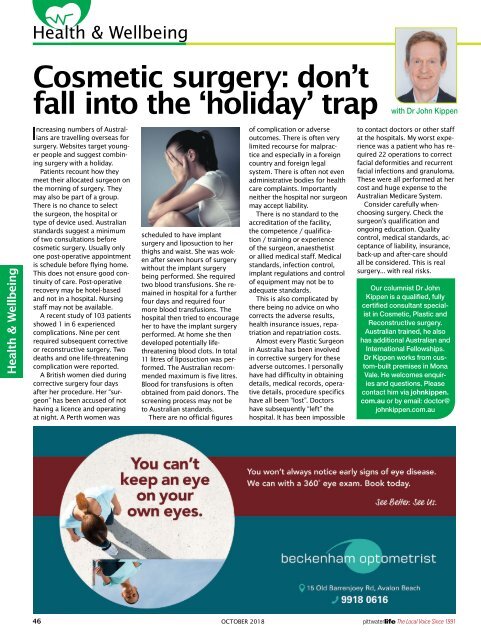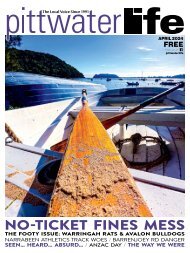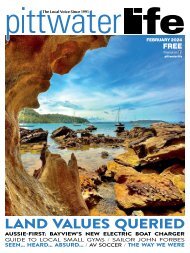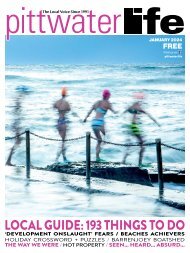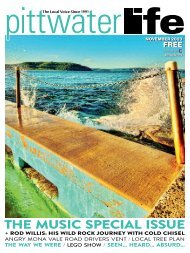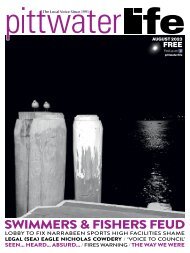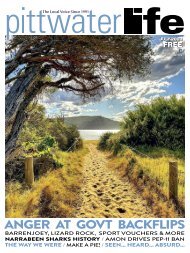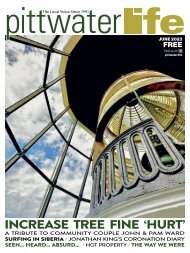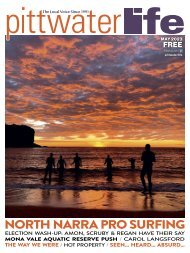Pittwater Life October 2018 Issue
Back to the beach. We're getting angry! Operation Go. Wherefore art though? Latest Local News.
Back to the beach. We're getting angry! Operation Go. Wherefore art though? Latest Local News.
- No tags were found...
Create successful ePaper yourself
Turn your PDF publications into a flip-book with our unique Google optimized e-Paper software.
Health & Wellbeing<br />
Health & Wellbeing<br />
Cosmetic surgery: don’t<br />
fall into the ‘holiday’ trap<br />
Increasing numbers of Australians<br />
are travelling overseas for<br />
surgery. Websites target younger<br />
people and suggest combining<br />
surgery with a holiday.<br />
Patients recount how they<br />
meet their allocated surgeon on<br />
the morning of surgery. They<br />
may also be part of a group.<br />
There is no chance to select<br />
the surgeon, the hospital or<br />
type of device used. Australian<br />
standards suggest a minimum<br />
of two consultations before<br />
cosmetic surgery. Usually only<br />
one post-operative appointment<br />
is schedule before flying home.<br />
This does not ensure good continuity<br />
of care. Post-operative<br />
recovery may be hotel-based<br />
and not in a hospital. Nursing<br />
staff may not be available.<br />
A recent study of 103 patients<br />
showed 1 in 6 experienced<br />
complications. Nine per cent<br />
required subsequent corrective<br />
or reconstructive surgery. Two<br />
deaths and one life-threatening<br />
complication were reported.<br />
A British women died during<br />
corrective surgery four days<br />
after her procedure. Her “surgeon”<br />
has been accused of not<br />
having a licence and operating<br />
at night. A Perth women was<br />
scheduled to have implant<br />
surgery and liposuction to her<br />
thighs and waist. She was woken<br />
after seven hours of surgery<br />
without the implant surgery<br />
being performed. She required<br />
two blood transfusions. She remained<br />
in hospital for a further<br />
four days and required four<br />
more blood transfusions. The<br />
hospital then tried to encourage<br />
her to have the implant surgery<br />
performed. At home she then<br />
developed potentially lifethreatening<br />
blood clots. In total<br />
11 litres of liposuction was performed.<br />
The Australian recommended<br />
maximum is five litres.<br />
Blood for transfusions is often<br />
obtained from paid donors. The<br />
screening process may not be<br />
to Australian standards.<br />
There are no official figures<br />
of complication or adverse<br />
outcomes. There is often very<br />
limited recourse for malpractice<br />
and especially in a foreign<br />
country and foreign legal<br />
system. There is often not even<br />
administrative bodies for health<br />
care complaints. Importantly<br />
neither the hospital nor surgeon<br />
may accept liability.<br />
There is no standard to the<br />
accreditation of the facility,<br />
the competence / qualification<br />
/ training or experience<br />
of the surgeon, anaesthetist<br />
or allied medical staff. Medical<br />
standards, infection control,<br />
implant regulations and control<br />
of equipment may not be to<br />
adequate standards.<br />
This is also complicated by<br />
there being no advice on who<br />
corrects the adverse results,<br />
health insurance issues, repatriation<br />
and repatriation costs.<br />
Almost every Plastic Surgeon<br />
in Australia has been involved<br />
in corrective surgery for these<br />
adverse outcomes. I personally<br />
have had difficulty in obtaining<br />
details, medical records, operative<br />
details, procedure specifics<br />
have all been “lost”. Doctors<br />
have subsequently “left” the<br />
hospital. It has been impossible<br />
with Dr John Kippen<br />
to contact doctors or other staff<br />
at the hospitals. My worst experience<br />
was a patient who has required<br />
22 operations to correct<br />
facial deformities and recurrent<br />
facial infections and granuloma.<br />
These were all performed at her<br />
cost and huge expense to the<br />
Australian Medicare System.<br />
Consider carefully whenchoosing<br />
surgery. Check the<br />
surgeon’s qualification and<br />
ongoing education. Quality<br />
control, medical standards, acceptance<br />
of liability, insurance,<br />
back-up and after-care should<br />
all be considered. This is real<br />
surgery... with real risks.<br />
Our columnist Dr John<br />
Kippen is a qualified, fully<br />
certified consultant specialist<br />
in Cosmetic, Plastic and<br />
Reconstructive surgery.<br />
Australian trained, he also<br />
has additional Australian and<br />
International Fellowships.<br />
Dr Kippen works from custom-built<br />
premises in Mona<br />
Vale. He welcomes enquiries<br />
and questions. Please<br />
contact him via johnkippen.<br />
com.au or by email: doctor@<br />
johnkippen.com.au<br />
46 OCTOBER <strong>2018</strong><br />
The Local Voice Since 1991


